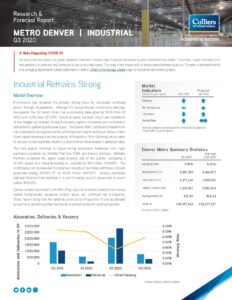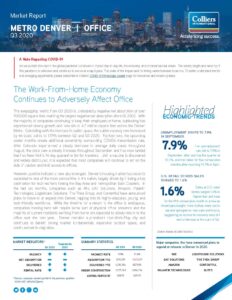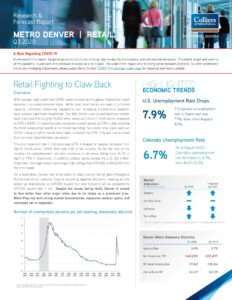Market Research
2020 Q3 Industrial Report
E-commerce has remained the primary driving force for industrial’s continued growth through the pandemic. Although US Census Bureau e-commerce data lags one-quarter, the Q2 results show that e-commerce sales grew by 31.8% from Q1 2020 and 44.5% from Q2 2019. Industrial space has been the primary benefactor of this staggering increase, driving third-party logistics companies and e-commerce distributors to gobble up additional space. The Denver Metro continues to benefit from robust demand in its regional market, which has been exacerbated by an inflow of West Coast capital stemming from the proposal of Proposition 15 in California, which seeks to tax commercial properties based on current market value instead of assessed value.
2020 Q3 Office Report
The eyepopping metric from Q3 2020 is undoubtedly negative net absorption of over 900,000 square feet, marking the largest negative net absorption since Q1 2002. With the majority of companies continuing to keep their employees at home, subleasing has experienced steady growth and now sits at 4.7 million square feet across the Denver Metro. Coinciding with the increase in sublet space, the sublet vacancy rate increased by 46 basis points to 1.59% between Q2 and Q3 2020. Furthermore, the upcoming cooler months create additional uncertainty surrounding COVID’s transmission rate. After Colorado experienced a steady decrease in average daily cases throughout August, the state saw a steady increase throughout September and has now landed itself on New York’s 14-day quarantine list for travelers. Until a vaccine is discovered and widely distributed, it is expected that most companies will continue to err on the side of caution and limit access to offices.
2020 Q3 Retail Report
With average daily confirmed COVID cases increasing throughout September, retail remains in an unprecedented state. While most retail stores are open in a limited capacity, continued distancing regulations and increasing e-commerce adoption have created significant headwinds. The Wall Street Journal and Business Insider have predicted that roughly 25,000 retail stores will close in 2020 alone compared to 2019’s 9,800. On a positive note, consumer spending was up 1.9% in July, marking the third consecutive month of increased spending. Non-store retail sales were up 20.1% in August while overall retail sales increased by 0.1%. Only gas stations and food services reported sales decreases.



